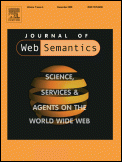 | |
| Discipline | Computer science |
|---|---|
| Language | English |
| Edited by | Valentina Presutti |
| Publication details | |
| History | 2003-present |
| Publisher | |
| Frequency | Bimonthly |
| 1.897 (2020) | |
| Standard abbreviations | |
| ISO 4 | J. Web Semant. |
| Indexing | |
| ISSN | 1570-8268 |
| OCLC no. | 628955055 |
| Links | |
The Journal of Web Semantics is a bimonthly peer-reviewed scientific journal published by Elsevier. It covers knowledge technologies, ontology, software agents, databases and the semantic grid, information retrieval, human language technology, data mining, and semantic web development. The journal is abstracted and indexed by Scopus and the Science Citation Index. According to the Journal Citation Reports , the journal has a 2020 impact factor of 1.897. [1]